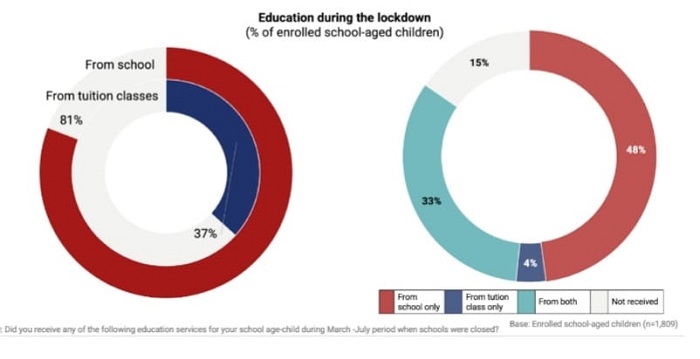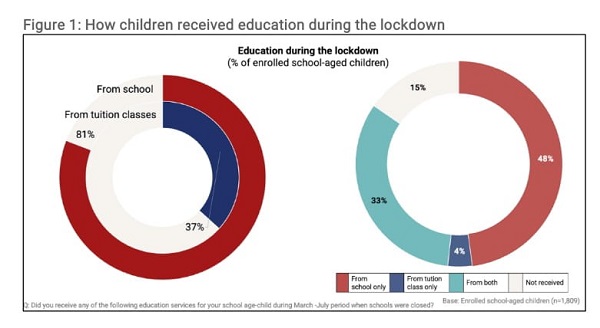
A new survey shows that 85% of enrolled school-aged children had some form of education services during school closures between March and July 2020. While some received educational services through multiple means, 54% of students received information, instructions, notes, or assignments sent to smartphone, tab, or computer, 50% had live lessons delivered over Zoom and other applications (potentially alongside other methods). Sixty percent received education services through ‘offline’ methods like physical delivery of material (also potentially alongside other methods).
The 2021 islandwide survey conducted by digital policy think tank, LIRNEasia, showed that though 85% received some form of education services, only 48% relied exclusively on services from their school, while 4% relied exclusively on tuition providers and 33% relied on both. (Figure 1).

The survey does not directly reveal information about the continuity or the quality of the education services provided, but the rate of dissatisfaction with the services provides some indication. Despite high access to remote education, over 58% of households were dissatisfied with their remote education experience.
Furthermore, inequalities in who had access were evident (e.g., children in better-off households being more likely to receive education) as well as what or how content was received (e.g., 50% had live online lessons while 50% did not). There were also inequalities in terms of receiving feedback, with just 48% receiving feedback and the balance 52% not.
According to co-convenor of the Education Forum Sri Lanka, Dr. Sujata Gamage, “These survey data are consistent with ground realities. Soon after schools closed, teachers and local education authorities mobilized whatever resources were at their disposal, whether using WhatsApp messages or leaving notes and assignments at the school gate for collection, to reach out to their students. Parents seem to have risen up to the challenge as well by increasing their Internet access. Of the households with enrolled school-age children, 76% had access to the Internet in 2020, in contrast to the 34% of such households in 2018, according to LIRNEasia’s AfterAccess survey. Not surprisingly, 90% of the enrolled children living in internet-connected households received remote education services.”
The survey also highlighted some of the difficulties that households faced in their children accessing education during this time, ranging from poor signal quality, to not having enough devices to go around in the house; and as stated, many remained dissatisfied with the entire experience.
The survey findings were released at a virtual launch event conducted on 8 December 2021, which included a panel discussion with leading government, private sector and civil society representatives. Panelists included Oshada Senanayake (Director General, Telecommunications Regulatory Commission of Sri Lanka & Chairman, ICT Agency of Sri Lanka), L. Ilaangovan, Secretary of Education, Cultural Affairs, Sports and Youth Affairs of the Northern Provincial), Jiffry Zulfer (Founder and CEO, PickMe), Karin Fernando (Team Leader for Sustainable Development, CEPA) & Gayani Hurulle (Senior Research Manager, LIRNEasia). The discussion was moderated by Rohan Samarajiva (Chair, LIRNEasia).
About the research: The research was funded by the International Development Research Centre (IDRC) through a grant given to three regional think tanks, LIRNEasia, Research ICT Africa and Instituto de Estudios Peruanos. The nationally representative sample for the survey conducted in Sri Lanka consisted of 2,500 households and individuals across the country covering 125 Grama Niladhari Divisions. The sampling methodology has been designed to ensure representation of the target group (population aged 15+) at a national level with a +/-2.8% margin of error at a confidence level of 95-percent. The data also allows for disaggregation by urban/rural divide, gender and socio-economic classification at the national level, as well as by within and outside the Western Province.
About LIRNEasia: LIRNEasia is an Asia Pacific ICT policy and regulation think tank. Its mission is to catalyze policy change through research to improve people’s lives in the emerging Asia Pacific by facilitating their use of hard and soft infrastructures through the use of knowledge, information and technology.